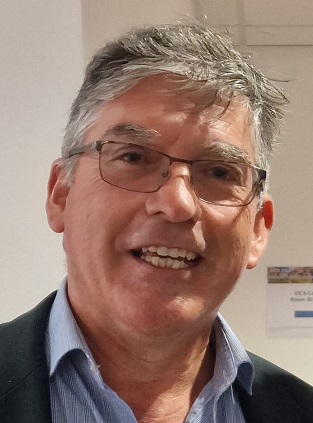 |
Professor Fabio Paternò
Istituto di Scienza e Tecnologie dell'Informazione
Consiglio Nazionale delle Ricerche in Pisa, Italy.
Abstract: Human Control in Daily Environment Automations
How people interact with digital technologies is currently caught between the Internet of Things and Artificial Intelligence. Such technological trends provide great opportunities, new possibilities, but there are also risks and new problems. There can be intelligent services that eventually generate actions that do not match the real user needs. The introduced automations can generate unwanted effects. People may have difficulties understanding how to customise the automatically generated automations. Thus, a fundamental challenge is how to provide tools that allow users to control and configure smart environments consisting of hundreds of interconnected devices, objects, and appliances. This means designing tools that allow people to obtain “humanations” (automations that users can understand and modify).
|
This talk will discuss concepts and methods that can be useful to address the core challenges of human control over automations involving people, objects, devices, and intelligent services. The goal is to identify innovative approaches to support end users, even without programming experience, to understand, create or modify the automations in their daily environments, augmenting the human capacity to manage automations through effective interaction modalities, relevant analytics, understandable explanations, and intelligent recommendations.
In this perspective, I will discuss how trigger-action programming can be a useful connection point between the wide variety of technologies and implementation languages considered and people without programming experience. However, it also presents nuances that may become apparent and critical in complex and realistic cases, generating undesired effects. In particular, three types of aspects must be considered carefully. Dealing with temporal aspects associated with triggers (events vs conditions) and actions (instantaneous vs prolonged vs sustained), which may not execute according to the user's expectations. Configuring smart environments with multiple active automations may result in unexpected effects. Security and/or privacy issues arising from the resulting automation should be understandable for the users.
|
|
Biography:
Prof. Fabio Paternò is Research Director at the Italian National Research Council, where he leads the Laboratory on Human Interfaces in Information Systems at the Information Science and Technologies Institute, in Pisa. He has been a principal investigator in several international and national projects, mainly in the area of Human-Computer Interaction. His current research interests are Interactive Smart Spaces, Accessibility, End-User Development, Human-centered Artificial Intelligence, and Humanoid Robots. He is an IFIP Fellow and a member of the ACM SIGCHI Academy.
|
|
 |
Professor Daniela Nicklas
Chair of Mobile Systems
University of Bamberg, Germany.
Abstract: Smart Cities – A Play Ground for Fog, Mobile Edge, and IOT-based Computing?
The smart city concept has evolved significantly over the years, reflecting the dynamic nature of urban development and technological advancements. Initially, the term "smart city" primarily focused on leveraging technology to enhance the efficiency and infrastructure of urban areas, often emphasizing sensor-based solutions for traffic management and resource optimization. It seemed to be an ideal playground for new technologies like Fog, Mobile Edge, and IOT-based computing.
However, in recent years, the definition has broadened to encompass a more holistic approach, highlighting technological innovation, sustainability, citizen engagement, and the overall quality of urban life.
|
This shift reflects a growing recognition that smart cities must prioritize human-centric solutions and environmental sustainability to thrive in the 21st century. To reach this goal, we must take the perspectives of many stakeholders in a city into account. Still, our systems are a future city's eyes, ears, and sometimes noses. And even with the rise of machine learning and artificial intelligence, one has to overcome many engineering challenges to build truly smart systems for future cities.
This talk highlights experiences and results stemming from over 10 years of experience in sensor-based research for smart systems, focusing on research that leaves the safe space of simulation-based implementations into the rough seas of installations and experiments in the real world.
|
|
Biography:
Since 2014, Daniela Nicklas has been a full professor at the University of Bamberg, Germany, and holds the Chair of Mobile Systems. Before that, she was a Junior professor of database and internet technologies at the Universität Oldenburg and a member of the Executive Board in the Transportation division at the OFFIS Institute for Computer Science. She came there from a PostDoc position at the Universität Stuttgart (2006-2008), where she also obtained her PhD in 2005, working on integrating large-scale spatial context models for mobile applications.
Her research interests are computer systems bridging the gap between the physical and digital worlds, focusing on data management for sensor-based systems and context-aware applications. She applies data stream management technologies to application domains such as smart cities, precision farming, pervasive computing, and situational awareness in general. In 2009, she received the IBM Exploratory Stream Analytics Innovation Award for "Data Stream Technology for Future Energy Grid Control."
Together with Prof. Dr. Marc Redepenning and Prof. Dr. Astrid Schütz, she manages the Smart City Research Lab Bamberg. She is a member of many program committees and organizing committees of pervasive computing and database conferences and workshops (e.g., PerCom, MDM, BTW, ...), a member of the editorial board of the Datenbankspektrum (German Journal on Databases) and the board of the German Society for Computer Science (GI).
| |
 |
Professor Johan Eker
Principal Researcher, Cloud & Software, Ericsson Research
Real-time control systems
Lund University, Sweden.
Abstract: Cloudy with a Chance of Offloading: The Lighter Side of Edge Computing
6G is expected to offer tight integration between communication and compute services, for example by providing AI-as-a-service to networked devices or in-network compute. One promising track is offloading, which expands and extends functionality in devices like XR headsets, smartphones, or IoT devices to remote computing environments. This is contrasting with typical edge computing which moves cloud functions closer to the user.
|
An offloading service would allow flexible and dynamic task deployment, enabling users to run their code remotely, anytime, anywhere. This approach is versatile in applicability, reduces device strain, and can improve application QoE, targeting a broader range of enterprises and developers without the complexities of traditional edge computing.
Different variants of device offloading solutions have popped up recently in both academic and industrial research. In this talk we want to discuss the technical implications and challenges, promising use-case application scenarios, and potential business opportunities related to device offloading.
|
|
Biography:
Prof. Johan Eker is a Principal Researcher at Ericsson Research and a Professor in real-time control systems at Lund university. He earned his PhD in 1999 and then joined the Ptolemy group at UC Berkeley. He is the leading the WASP research arena on data-driven operations (WARA-Ops). His current research focus is on control of large scale compute systems, but his research interests range from programming language design for parallel hardware, real-time control systems, mobile communications. software design for mobile devices, adaptive resource management, IoT and cloud technology. He is the co-designer of the CAL Actor Language, which is part of the MPEG standard ISO/IEC 23001-4:2011. He holds over 70 granted patents in the areas of telecom, IoT and cloud computing. He is involved in the operation of the Ericsson Research Data Center and works with industrial cloud applications.
| |
 |
Daniel J. Beutel
Flower Labs GmbH, Germany
Tutorial Abstract: Federated Learning for IoT
As the Internet of Things (IoT) continues to proliferate, the need for advanced, privacy-preserving machine learning techniques becomes paramount. Federated learning (FL) offers a decentralized approach that enables edge devices to collaboratively train models without sharing raw data, thus preserving privacy and enhancing security. This tutorial provides an in-depth exploration of federated learning within the IoT context. We will cover the foundational principles of FL, its architecture, and key algorithms. Participants will learn about the unique challenges of applying FL to IoT, including data heterogeneity, limited computational resources, and communication constraints. Practical sessions will include hands-on exercises with the Flower (https://flower.ai) federated learning framework, demonstrating how to implement FL. Attendees will gain
insights into the latest research advancements, best practices, and future directions in federated learning for IoT, equipping them with the knowledge to leverage FL in their own IoT applications.
|
Biography:
Daniel is a key contributor to the field of federated learning and one of the creators of Flower (https://flower.ai), an open-source framework for training AI on distributed data. Flower has become a leading federated AI ecosystem, used by Fortune 500 companies and top universities worldwide. Daniel's work has advanced the field significantly, resulting in numerous scientific publications and collaborations. He is currently a PhD candidate in Computer Science at
the University of Cambridge and co-founder of Flower Labs. At this conference, Daniel will present a comprehensive 3-hour tutorial on federated learning in the context of IoT.
| |
|